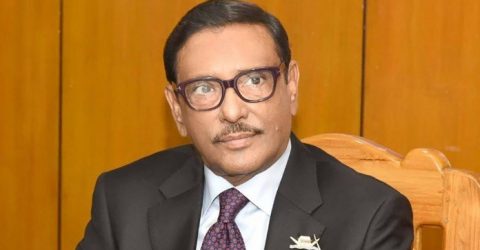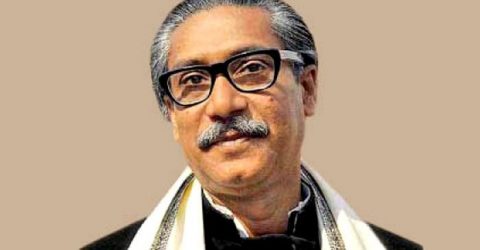‘Bangamata heartened Bangabandhu to pen 3 invaluable autobiographic books’
The Bangladesh The Bangladesh
Today

Bangamata had played a very crucial role in heartening Bangabandhu to pen the drafts of three invaluable autobiographic books which would always remain as precious asset in the history of Bangladesh, academician Prof AAMS Arefin Siddique said.
“We talked about Bangabandhu at different times. His speeches and statements have been preserved in different ways. But expressing his own memories in his own words is a rare one and it had been possible because of Bangamata,” he said.
In an interview on the occasion of Bangamata Sheikh Fazilatunnesa Mujib’s 92nd birth anniversary, Prof Arefin, Dhaka University former vice-chancellor, said Bangamata inspired and requested Bangabandhu to write the books.
“If Bangamata didn’t take the steps, it was not possible to present such valuable three books to the new generation to let them know about the great leader as well as the contemporary political history of the nation,” he said.
Prof Arefin, also a noted communication expert, said Bangabandhu in his own reminiscence in the ‘Unfinished Memoirs’ also mentioned how Bangamata inspired him to write the books.
Turning to Bangamata’s different roles in society, he said after the independence, Bangamata had taken the initiative for the first time to rehabilitate the Biranganas (war heroines), the women who were brutally tortured and repressed by Pakistani occupational forces and their local collaborators during the Liberation War.
Under the leadership of Begum Mujib, the works of rehabilitating the repressed women began at Bangabandhu’s Dhanmondi 32 residence for the first time, he mentioned.
She gathered some distinguished women of society and held meetings at Dhanmondi 32 residence to decide how to cooperate with the government and extend support to Bangabandhu in rehabilitating the group of women, he said.
Mentioning an example of tolerance and patience of Bangamata, Prof Arefin, also chairman of the board of directors of the BSS, said during the Kolkata Hindu-Muslim riots in 1946, Bangabandhu was a student leader of Islamia College in Kolkata and he was working to neutralize the riots under the leadership of Hussain Shaheed Suhrawardy.
“But Begum Mujib was an expecting mother and ill at that time. Bangabandhu was thinking about going to Gopalganj. But Bangamata wrote a letter to Bangabandhu mentioning that ‘Now you have a big responsibility. The society needs you . . . the society is looking at you. You should work for the society now. Don’t be anxious about me. I can handle my matters,” he said, referring to Bangabandhu’s autobiography.
He said: “Bangabandhu told Suhrawardy about the matter. Then Suhrawardy told Bangabandhu that ‘you are a lucky person. Almighty Allah gifted her to your life.”
“We can realize from this comment of a politician about another politician’s wife that how much tolerant and patient Begum Mujib was and how much love was in her heart for the people. She always motivated her husband to work for society even when she needed him beside her,” he mentioned.
Talking to BSS on the eve of Bangamata’s birth anniversary in 2021, National Professor Rafiqul Islam who died several months later, had said Bangamata had very strong contributions in every democratic movements of this soil, including the 1966 six-point movement, struggles against Agartala Conspiracy case, mass-upsurge and the great Liberation War as she always gave very significant suggestions to Bangabandhu.
For example, before the historic March 7 speech, there were lots of discussions about what Bangabandhu would say in his speech on March 7 (1971) and at that time Bangamata played the biggest role, he said.
“Many Awami League leaders and others had given different suggestions and opinions to Bangabandhu. But Bangamata told Bangabandhu, ‘You have fought for the people throughout your life. You know best what to say. Say what you have in your heart’ and Bangabandhu exactly did that and now that is one of the greatest speeches of the world,” he said.
Citing an example of Bangamata’s farsightedness, Prof Islam, also a noted academician and researcher, said when Bangabandhu and 34 others were arrested in Agartala conspiracy case, some Awami League leaders suggested taking Bangabandhu’s release on parole but Bangamata rejected the proposal.
“Bangamata rejected the proposal as she didn’t want to destroy Bangabandhu’s enormous sacrifices for the nation by releasing him on parole. As Bangabandhu was not released on parole, the Pakistani rulers were forced to release him unconditionally,” he mentioned.
Supplementing his comment, Prof Arefin Siddique said Bangamata’s decision to reject Bangabandhu’s release on parole in Agartala Conspiracy case changed the course of the country’s political history.
He said Bangamata had taken the right decision by rejecting the proposal of Bangabandhu’s release on parole for holding a roundtable discussion in the then West Pakistan.
The right and timely decision had forced the Pakistani rulers to withdraw the Agartala Conspiracy case releasing Bangabandhu unconditionally and it changed the course of Bangladesh’s political history as well, he said.




